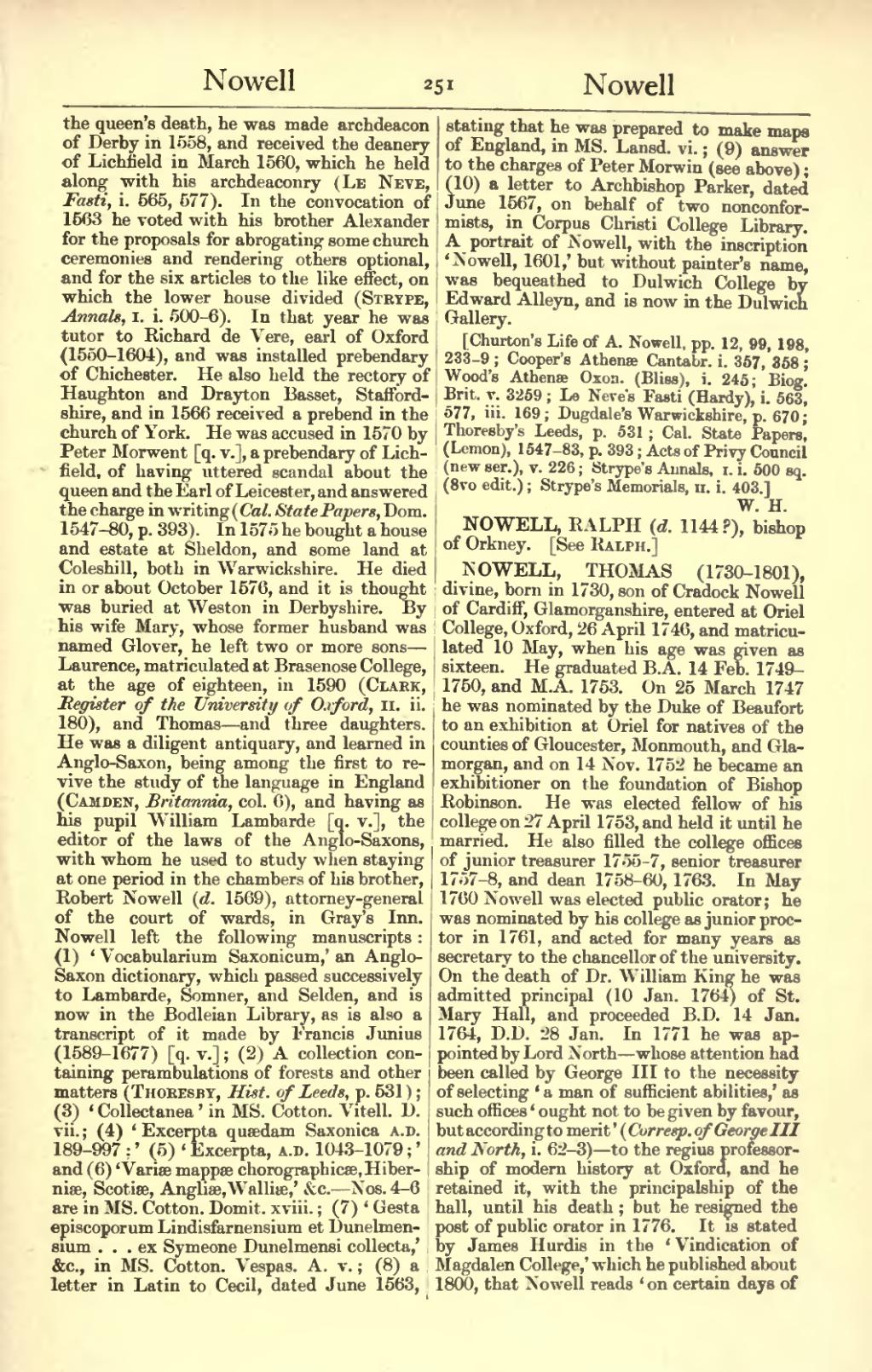the queen's death, he was made archdeacon of Derby in 1558, and received the deanery of Lichfield in March 1560, which he held along with his archdeaconry (Le Neve, Fasti, i. 565, 577). In the convocation of 1563 he voted with his brother Alexander for the proposals for abrogating some church ceremonies and rendering others optional, and for the six articles to the like effect, on which the lower house divided (Strype, Annals, i. i. 500–6). In that year he was tutor to Richard de Vere, earl of Oxford (1550–1604), and was installed prebendary of Chichester. He also held the rectory of Haughton and Drayton Basset, Staffordshire, and in 1566 received a prebend in the church of York. He was accused in 1570 by Peter Morwent [q. v.], a prebendary of Lichfield, of having uttered scandal about the queen and the Earl of Leicester, and answered the charge in writing (Cal. State Papers, Dom. 1547–80, p. 393). In 1575 he bought a house and estate at Sheldon, and some land at Coleshill, both in Warwickshire. He died in or about October 1576, and it is thought was buried at Weston in Derbyshire. By his wife Mary, whose former husband was named Glover, he left two or more sons—Laurence, matriculated at Brasenose College, at the age of eighteen, in 1590 (Clark, Register of the University of Oxford, ii. ii. 180), and Thomas—and three daughters. He was a diligent antiquary, and learned in Anglo-Saxon, being among the first to revive the study of the language in England (Camden, Britannia, col. 6), and having as his pupil William Lambarde [q. v.], the editor of the laws of the Anglo-Saxons, with whom he used to study when staying at one period in the chambers of his brother, Robert Nowell (d. 1569), attorney-general of the court of wards, in Gray's Inn. Nowell left the following manuscripts: (1) ‘Vocabularium Saxonicum,’ an Anglo-Saxon dictionary, which passed successively to Lambarde, Somner, and Selden, and is now in the Bodleian Library, as is also a transcript of it made by Francis Junius (1589–1677) [q. v.]; (2) A collection containing perambulations of forests and other matters (Thoresby, Hist. of Leeds, p. 531); (3) ‘Collectanea’ in MS. Cotton. Vitell. D. vii.; (4) ‘Excerpta quædam Saxonica A.D. 189–997;’ (5) ‘Excerpta, A.D. 1043–1079;’ and (6) ‘Variæ mappæ chorographicæ, Hiberniæ, Scotiæ, Angliæ, Walliæ,’ &c.—Nos. 4–6 are in MS. Cotton. Domit. xviii.; (7) ‘Gesta episcoporum Lindisfarnensium et Dunelmensium … ex Symeone Dunelmensi collecta,’ &c., in MS. Cotton. Vespas. A. v.; (8) a letter in Latin to Cecil, dated June 1563, stating that he was prepared to make maps of England, in MS. Lansd. vi.; (9) answer to the charges of Peter Morwin (see above); (10) a letter to Archbishop Parker, dated June 1567, on behalf of two nonconformists, in Corpus Christi College Library. A portrait of Nowell, with the inscription ‘Nowell, 1601,’ but without painter's name, was bequeathed to Dulwich College by Edward Alleyn, and is now in the Dulwich Gallery.
[Churton's Life of A. Nowell, pp. 12, 99, 198, 233–9; Cooper's Athenæ Cantabr. i. 357, 358; Wood's Athenæ Oxon. (Bliss), i. 245; Biog. Brit. v. 3259; Le Neve's Fasti (Hardy), i. 563, 577, iii. 169; Dugdale's Warwickshire, p. 670; Thoresby's Leeds, p. 531; Cal. State Papers, (Lemon), 1547–83, p. 393; Acts of Privy Council (new ser.), v. 226; Strype's Annals, i. i. 500 sq. (8vo edit.); Strype's Memorials, ii. i. 403.]
NOWELL, RALPH (d. 1144?), bishop of Orkney. [See Ralph.]
NOWELL, THOMAS (1730–1801), divine, born in 1730, son of Cradock Nowell of Cardiff, Glamorganshire, entered at Oriel College, Oxford, 26 April 1746, and matriculated 10 May, when his age was given as sixteen. He graduated B.A. 14 Feb. 1749–1750, and M.A. 1753. On 25 March 1747 he was nominated by the Duke of Beaufort to an exhibition at Oriel for natives of the counties of Gloucester, Monmouth, and Glamorgan, and on 14 Nov. 1752 he became an exhibitioner on the foundation of Bishop Robinson. He was elected fellow of his college on 27 April 1753, and held it until he married. He also filled the college offices of junior treasurer 1755–7, senior treasurer 1757–8, and dean 1758–60, 1763. In May 1760 Nowell was elected public orator; he was nominated by his college as junior proctor in 1761, and acted for many years as secretary to the chancellor of the university. On the death of Dr. William King he was admitted principal (10 Jan. 1764) of St. Mary Hall, and proceeded B.D. 14 Jan. 1764, D.D. 28 Jan. In 1771 he was appointed by Lord North—whose attention had been called by George III to the necessity of selecting ‘a man of sufficient abilities,’ as such offices ‘ought not to be given by favour, but according to merit’ (Corresp. of George III and North, i. 62–3)—to the regius professorship of modern history at Oxford, and he retained it, with the principalship of the hall, until his death; but he resigned the post of public orator in 1776. It is stated by James Hurdis in the ‘Vindication of Magdalen College,’ which he published about 1800, that Nowell reads ‘on certain days of
